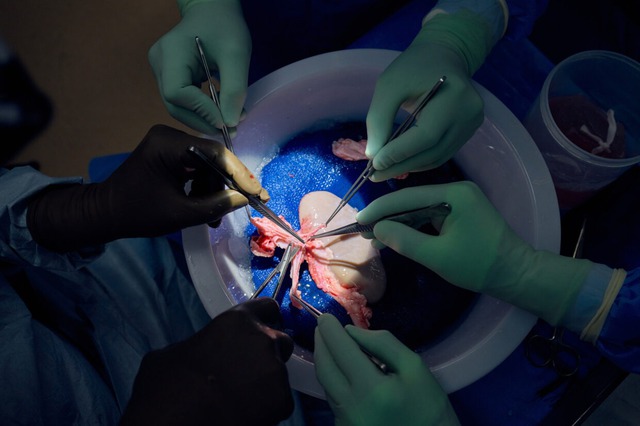Breakthrough: American Doctors Transplant Pig Kidneys To Humans, And Dream Of An Endless Supply Of Organs

A surgical team at the Langone Institute for Transplantation, New York University, USA, says they have successfully performed a groundbreaking experiment: Transplanting a pig kidney into the body of a 57-year-old man with brain death.
The kidney then worked for 32 days without being eliminated. It produced urine just 4 minutes after restoring circulation, demonstrating its ability to filter out toxins based on a drop in creatinine levels – an indicator used to evaluate patients with kidney failure.
The team said this is the first time a pig kidney has survived this long in the human body and they are continuing to monitor it to see if it can survive a second month.
Last year, it was the team at the Langone Institute who transplanted the first pig heart in history to a patient with heart failure. The heart then lived in this man’s body for about 2 months.
Efforts to transplant pig organs into humans are in a field known as xenotransplantation. Despite a history of hundreds of years, heterozygous transplantation has only made significant progress in the last few years, thanks to gene editing techniques.
For example, by deleting the pig gene and adding the human gene, scientists have created pigs with hearts, kidneys and corneas more suitable for transplantation into us.
Xenotransplantation is hoped to help solve the shortage of organs, thereby saving the lives of millions of patients every year around the world.
Genetically modified pigs now open up new odds
The idea of reconciling differences in the animal and human genomes puts scientists down a rut. Accordingly, they think that primates, which are closely related to humans, will provide a higher success rate in heterologous transplants.
But Dr. David Cooper, director of the Allogeneic Transplant program at the University of Alabama’s Birmingham School of Medicine, opposes it.
According to him, primates are not the best organ donors for humans. For example, a monkey heart will fail to pump blood to the entire body, not because it is unacceptable, but because of its small size.
Based on organ proportions, Dr. Cooper thinks pigs are the species with the most potential for us. They have hearts, livers and kidneys that are suitable for transplantation. Meanwhile, it is possible to integrate the immune system between pigs and humans.
In February this year, these two kidneys were transplanted to a 52-year-old patient who also suffered brain death. Compared with 54 hours of life in the female patient at the Langone Institute, the kidneys this time have extended the life time up to 7 days, more than 3 times what the team at Langone achieved in 2021.
The transplanted pig kidneys produced urine within four minutes of reperfusion and produced more than 37 liters of urine in the first 24 hours. They continued to function as in live humans throughout the seven days of the study.
In addition, the kidneys were still functioning at the end of the study with a final serum creatinine level of 0.9 mg/dL and a creatinine clearance of 200 ml per minute,” said Birmingham Medical School press release.
Creatinine clearance is the volume of creatinine-cleared plasma per unit of blood. In particular, creatinine is a waste product from muscle action in the body, usually filtered and excreted by the kidneys. In patients with renal failure, their creatinine level above the threshold of 1.2 mg/dL can be toxic to the body.
Now, two GalSafe pig kidneys have brought that number down to 0.9 mg/dL. That’s direct evidence that genetically engineered pig kidneys work.
“This is the first time in history that someone has demonstrated that genetically modified pig kidneys also have kidney function and are life-sustaining in humans,” said Dr. Jayme E. Locke, lead author of the study. at the Birmingham School of Medicine.
Not giving up in the race to transplant the mutant, in July this year, the team from the Langone Institute, New York University returned with a new groundbreaking experiment. In it, they also transplanted a GalSafe pig kidney to a 57-year-old male patient with brain death.
This time, they kept the kidney alive in his body for 32 days. And now the number is still increasing because the kidney is considered healthy.
Unlike previously transplanted GalSafe pig kidneys that required up to 10 genes to become compatible, the kidney transplanted by the Langone Institute in July required only a single gene edit.
“We think the kidney needs less genetic manipulation than the pig’s heart to be accepted by the human immune system,” said Dr. Robert Montgomery, director of the Langone Transplant Institute.
“Simplifying genetic engineering means we can create more of these kidneys to provide an inexhaustible source of kidneys for patients who need them.”




